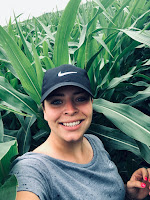Thursday, August 29, 2019
When I began my internship this summer, I wasn't sure what I was getting myself into. I had a vague idea of what my intership was going to involve, but I still wasn't sure of any specific tasks or experiences I might have. I had the opportunity to serve as the GROWMARK Agronomy Intern for M&M Service Company this summer, which is right around my area. I was fully prepared to be involved in helping with spraying, planting, and whatever else they asked of me. But when I went to my Orientation meeting for the interns in Bloomington, my expectations shifted. GROWMARK is so diverse in its business that it seemed like every intern would be doing something different for their respective member companies. Some interns were doing some regular crop scouting, while others
would be working with new technology, implementing new practices, and conducting special projects for each member company.
When I started my first day at M&M, my supervisor took me to each location in our area, showing me their purpose and what they did on a regular basis. He then gave me my mission for the summer: IntelinAir. IntelinAir is a company that was recently licensed by GROWMARK, and its main purpose is to use aerial pictures of fields taken from manned aircraft and using them to more efficiently and quickly spot and scout fields. My main mission was to use the technology, get some data from ground truthing the fields, and reporting it back to the salesmen, who would in turn show and teach their growers about the technology. This was a shock to me, because I had never used any sort of technology like this. It was so new that even my coworkers and superiors weren't entirely sure how it worked. So it took some time, but with enough playing with the app and trying things, I was able to figure it out.
But then the weather interfered. As many who are reading this may be well aware, the planting season of 2019 was incredibly difficult. Rain relentlessly pounded the soil and prevented farmers from even getting into the field. Because of this, all of the crops fell behind in maturity, and there was nothing to do with my project for the beginning of the summer. Because of this, I was instructed to go to a different location each week and help however I could, as well as learn as much as I could in the process.
So I bounced around from one location to the next, learning the operations of Pesticide, Fertilizer, and Seed throughout the company. I also got to help with the planting and maintenance of the variety test plots throughout the company. There was quite a bit that I got to do, and it was really cool getting to meet all of the employees along the way.
Eventually, the crops started growing and I was able to start focusing on my project. This was challenging at the beginning, because in the early developmental stages of the crops, it was hard to find readings of the specific filters on the app to identify which fields to scout. There was no way of telling if the effects on a field were merely from stress from the rain, or just needing time. So, I went to a variety of fields trying to find results, and as time went on there seemed to be more problems popping up on the app. So, for the next several weeks I spent my time scouting fields, analyzing the app, and reporting my findings to the salesmen. In this time period, I learned more about ag tech then I had in any of my previous internships.
This past summer was one of the strangest adventures of my life, but it was also an incredible experience. I got to learn all about the retail and industrial side of agriculture, whereas I had only know the production side previously. I also have a better understanding and appreciation for where ag tech is headed, as well as an interest in possibly working more with it in the future. I had a great experience learning from my supervisor and coworkers, and I hope that I was able to put my foot in the door for potential future employment.





















